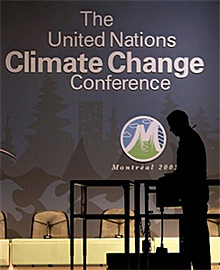 |
 |
 |
 Editorials | Environmental | November 2005 Editorials | Environmental | November 2005  
U.N. Talks Seek to Ease Global Warming Dispute
 Alister Doyle - Reuters Alister Doyle - Reuters


| | A technician checks the lights prior to the start of the United Nations Climate Change Conference in Montreal November 27, 2005. A U.N. conference opening in Canada on Monday will try to step up a fight against global warming by drawing the United States and developing nations into U.N.-led agreements beyond 2012. (Reuters/Christinne Muschi) |
Montreal, Canada - A U.N. conference opening in Canada on Monday will try to step up a fight against global warming by drawing the United States and developing nations into U.N.-led agreements beyond 2012.

About 10,000 delegates - from 189 governments, environmental lobby groups and businesses - will attend the November 28-December 9 talks meant to start mapping out what to do after the first period of the U.N.'s Kyoto Protocol ends in 2012.

"We have no choice" but to act, Canada's Environment Minister Stephane Dion said of the fight to curb a human-induced warming that may spur more hurricanes, floods, droughts and drive up sea levels by almost a meter (3 feet) by 2100.

Climate change "is the worst threat the world is facing from an environmental perspective. ... It's putting at risk our relationship with the planet," he said on the eve of the talks. But the world is deeply split over what to do.

The United States, the world's biggest polluter, and Australia have rejected Kyoto, under which 40 industrialized nations have agreed to cut their emissions of heat-trapping gases by 5.2 percent below 1990 levels by 2008-12.

President George W. Bush has said Kyoto would eliminate U.S. jobs and wrongly excludes developing nations. He is focusing on new technology, rather than Kyoto-style caps.

But many nations and environmentalists say tougher action is needed, including a start to talks on involving developing nations such as China and India in limiting the growth of their emissions.

The 10 hottest years since records began in the 1860s have come since 1990 and most scientists blame rising temperatures on a build-up of greenhouse gases from carbon dioxide released by burning fossil fuels in power plants, factories and cars.

2008 Deadline

"We think we should have agreement on what comes after Kyoto by 2008," said Jennifer Morgan, climate policy expert at the WWF environment group.

She said 2008 would give businesses, and investors in new markets for trading in carbon dioxide emissions, enough time to adapt. Government delegates said, however, that no timetable was likely to be set by the talks.

On Monday, the meeting will open with ceremonies and pleas to find ways to break the deadlock. Dion is due to be elected president of the conference even though Canada's minority Liberal government looks set to lose a vote of confidence later on Monday that will trigger an election campaign.

Dion would, however, stay on as head of the Montreal talks.

The meeting includes both the 156 nations which have ratified Kyoto and a total of 189 countries, including the United States, which back the wider U.N. climate convention.

The meeting will seek to reaffirm details of the rules for Kyoto, including penalties for noncompliance, and to streamline a scheme meant to attract investments in clean energy projects in developing nations.

The International Emissions Trading Association (IETA) says $100 billion could be channeled into projects in the developing world, like using solar energy in Kenya or methane in Peru, if the "clean development mechanism" were reformed.

Inuit hunters whose livelihoods are under threat from a melting of polar ice handed out samples of indigenous foods to delegates on the eve of the talks - including slices of narwhal, an endangered tusked whale. | 
 | |
 |



